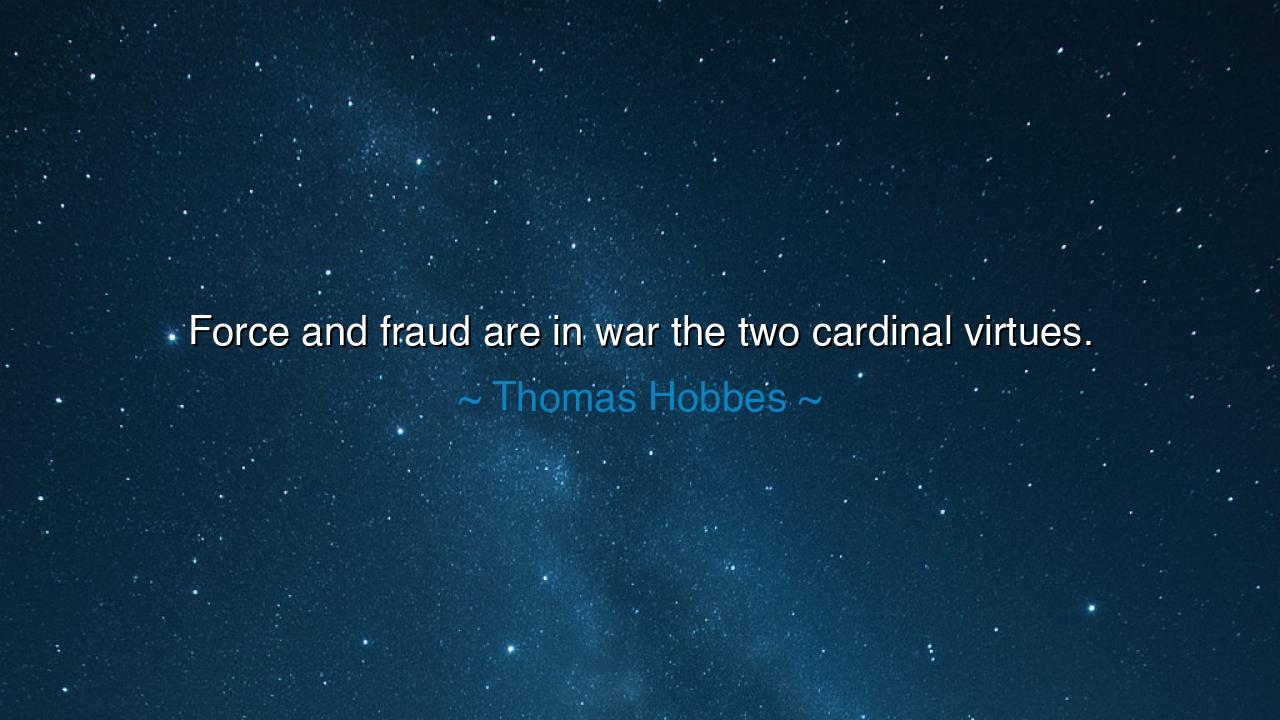
Force and fraud are in war the two cardinal virtues.






The English philosopher Thomas Hobbes, who lived through the storms of civil strife in the seventeenth century, declared with stark and unsettling clarity: “Force and fraud are in war the two cardinal virtues.” In this saying, Hobbes strips war of its illusions, presenting it not as a field of honor but as a theater where violence and deception reign supreme. To him, war is not governed by morality but by necessity, not by lofty ideals but by the brutal tools that secure survival.
The origin of this thought lies in Hobbes’s great work, Leviathan, where he described life in the “state of nature” as “solitary, poor, nasty, brutish, and short.” In such a condition, where laws and order collapse, men are thrown into perpetual conflict. In this realm of chaos, Hobbes argued, the only virtues that matter are force, the ability to overpower, and fraud, the cunning to deceive. For when survival itself is at stake, the codes of morality give way, and only those who master strength and stratagem endure.
This harsh vision can be seen in the annals of history. Consider the Trojan War, immortalized by Homer. The Greeks besieged Troy for ten years, wielding the force of arms without success. In the end, it was not strength but fraud—the cunning deception of the wooden horse—that brought victory. Here is Hobbes’s truth incarnate: in war, brute power and guile together decide the fate of nations. The warriors may speak of honor, but the victors are those who wield both the sword and the stratagem.
Another example lies in the Second World War. The Allies triumphed not only by sheer force, through their armies, tanks, and fleets, but also by fraud, in the form of deception operations. The most famous was Operation Fortitude, where the Allies tricked Germany into believing the D-Day invasion would come at Calais rather than Normandy. Inflatable tanks, false radio transmissions, and double agents wove a web of lies that misled the enemy and ensured the success of the greatest amphibious assault in history. Thus Hobbes’s principle again proved true: war bends to the will of strength and cunning.
Yet Hobbes’s words are not meant to glorify war, but to warn us. By calling force and fraud the “virtues” of war, he shows that what we call virtues in peace—justice, honesty, mercy—are cast aside in conflict. War inverts morality: what would be condemned in peace is praised in battle. To deceive an enemy is celebrated, to crush them is honorable. This inversion is the great tragedy of war, for it reveals how fragile our codes of right and wrong are when tested by survival.
For us, the lesson is profound. We must understand the nature of war truthfully, without illusion. It is not a noble enterprise, but a descent into a realm where the darkest tools become the highest virtues. If we wish to preserve justice, honesty, and compassion, then we must strive to avoid war wherever possible. For once it begins, those virtues are silenced, and force and fraud become the only rulers.
Therefore, let this wisdom endure: see war for what it is, and do not clothe it in false honor. Recognize that strength and cunning may win battles, but they cannot build peace. If you must fight, wield them with solemnity, knowing what they cost. But better still, labor always to keep the peace, where true virtues—justice, mercy, truth—can flourish. For as Hobbes teaches, in war all is consumed by force and fraud, but in peace, the higher virtues of humanity can at last prevail.






MDMai Minh Duc
When I read this quote, I’m reminded of how war often distorts human values. Force and fraud, once considered negative traits, are elevated in the context of war. Does this mean that in war, we abandon our ethical principles, or does it highlight the moral ambiguity that comes with conflict? Is war truly a place where survival justifies the worst of human behavior, or can we find ways to mitigate the cruelty?
NTNguyen Thien
Hobbes' quote raises questions about the nature of war. If force and fraud are essential for victory, then where does that leave honor, justice, or humanity? Is the goal of war just to win, or is there a deeper meaning to the sacrifices made? At what point do the ‘virtues’ of war start to erode the moral foundation of society as a whole? It’s a question that still feels relevant today.
MQHuynh Ngo Minh Quan
It’s disturbing to think of force and fraud as virtues, but Hobbes’ point might be that war is a context where normal moral rules don’t apply. If war is a fight for survival, does that justify anything that leads to victory? I find it hard to accept that such actions could be virtuous, but can we say Hobbes is wrong if it’s a matter of life and death in war?
TMPhung thanh mai
I’m not sure how to feel about Hobbes’ view of war. By labeling force and fraud as virtues, is he trying to show how war distorts the very notion of morality, or is he just acknowledging that these are the tactics needed to survive? In a way, it makes war seem like a survival game rather than something noble. But does this mean there’s no place for ethics in the battlefield?
NQ32- le nhu quynh
This quote feels unsettling because it presents a stark reality of war. Force and fraud being called virtues means that war strips away moral considerations and sees victory as the only measure of success. But can we really accept such a perspective in modern times? Do we still view force as necessary in certain conflicts, or has the world evolved beyond these brutal 'virtues' in diplomacy?